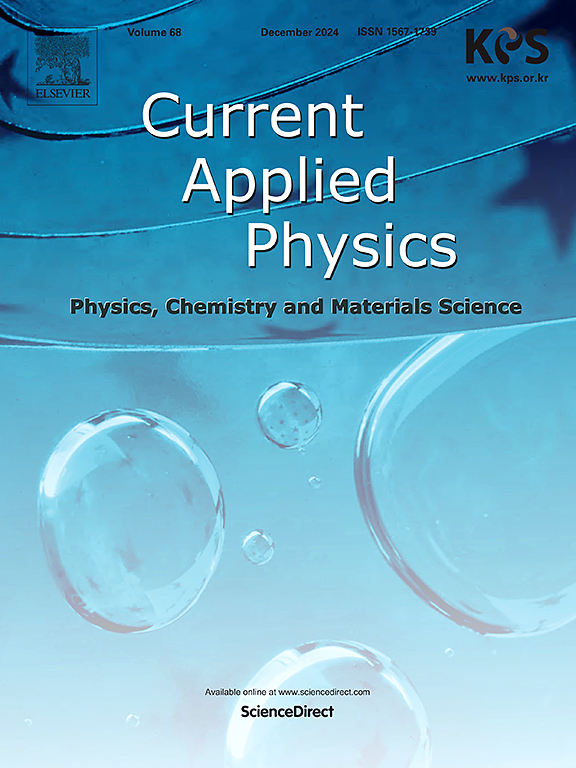Piezoelectric flexible generator based on Mn-doped ZnO/PVDF composite films for energy harvesting application
IF 2.4
4区 物理与天体物理
Q3 MATERIALS SCIENCE, MULTIDISCIPLINARY
引用次数: 0
Abstract
A flexible piezoelectric energy harvesting device was manufactured using Mn-doped ZnO (MnZ)/poly (vinylidene fluoride) (PVDF) composite film of various proportions of MnZ particles (5 wt%, 10 wt%, 20 wt% and 30 wt%) within the PVDF matrix. The phase formation, crystallinity and morphological characteristics of the fabricated composite films were analysed with the help of Fourier transform infrared (FTIR), X-ray diffraction (XRD), and Scanning Electron Microscopy (SEM). The piezoelectric performance of the constructed piezoelectric generator (PEG) device was measured by applying force on its surface which produced a significantly high open-circuit voltage of 344V and power density of 4.53 mW/cm2. Besides, these lead-free composite devices demonstrated remarkable sensitivity for human body motion detection in punching, finger bending, and wrist bending. Furthermore, practical usage of the fabricated PEG device was shown by powering devices like wristwatches, digital thermometers and glowing 20 light-emitting diodes (LEDs) of different colours.

基于掺锰 ZnO/PVDF 复合薄膜的压电柔性发电机的能量采集应用
使用掺锰氧化锌(MnZ)/聚偏二氟乙烯(PVDF)复合膜制造了一种柔性压电能量收集装置,在 PVDF 基体中掺入了不同比例的 MnZ 颗粒(5 wt%、10 wt%、20 wt% 和 30 wt%)。利用傅立叶变换红外(FTIR)、X 射线衍射(XRD)和扫描电子显微镜(SEM)分析了所制复合薄膜的相形成、结晶度和形态特征。通过在其表面施加力,测量了所构建的压电发生器 (PEG) 器件的压电性能,其开路电压高达 344V,功率密度为 4.53 mW/cm2。此外,这些无铅复合器件在打孔、手指弯曲和手腕弯曲等人体运动检测方面表现出了极高的灵敏度。此外,通过为手表、数字温度计和 20 个不同颜色的发光二极管(LED)等设备供电,展示了所制造的 PEG 器件的实际用途。
本文章由计算机程序翻译,如有差异,请以英文原文为准。
求助全文
约1分钟内获得全文
求助全文
来源期刊

Current Applied Physics
物理-材料科学:综合
CiteScore
4.80
自引率
0.00%
发文量
213
审稿时长
33 days
期刊介绍:
Current Applied Physics (Curr. Appl. Phys.) is a monthly published international journal covering all the fields of applied science investigating the physics of the advanced materials for future applications.
Other areas covered: Experimental and theoretical aspects of advanced materials and devices dealing with synthesis or structural chemistry, physical and electronic properties, photonics, engineering applications, and uniquely pertinent measurement or analytical techniques.
Current Applied Physics, published since 2001, covers physics, chemistry and materials science, including bio-materials, with their engineering aspects. It is a truly interdisciplinary journal opening a forum for scientists of all related fields, a unique point of the journal discriminating it from other worldwide and/or Pacific Rim applied physics journals.
Regular research papers, letters and review articles with contents meeting the scope of the journal will be considered for publication after peer review.
The Journal is owned by the Korean Physical Society.
 求助内容:
求助内容: 应助结果提醒方式:
应助结果提醒方式:


